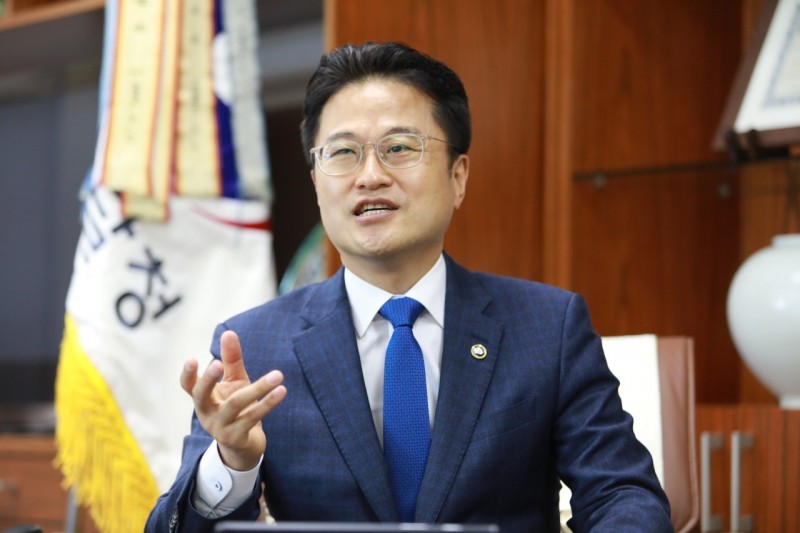
South Korea’s central government procurement agency has been stepping up efforts to support small and medium-sized enterprises in the health sector eyeing on the international procurement markets in the pandemic era.
And its support is adding momentum to the nation’s exports of pandemic-related goods, a state-led recovery model from the virus, its chief said in a recent interview with The Korea Herald.
“Since last year, local SMEs producing quarantine products such as face masks or COVID-19 self-test kits have signed export deals worth 13 billion won ($11 million) in six markets, including the United States, Qatar and Egypt, through the Public Procurement Service’s consultation services designed to help them enter bids with overseas procurement projects,” said PPS Administrator Kim Chung-woo.
Of the total, nearly 6 billion won of export orders were received from the US’ public procurement market. Korea’s KF94 masks, which offer a high-quality filter, gained popularity there after the Biden administration stressed the wearing of face masks to combat the virus spread.
“Responding to rising global demand for emergency quarantine items in the public sector, fueled by the virus resurgence, the PPS will invest 800 million won in related support programs by the end of this year.”
The sessions will include various exchange programs between local SMEs and prospective foreign buyers, consultations on business strategies as well as writing bidding proposals.
The PPS has been working to speed up the entry of local enterprises into overseas markets, both to promote the country’s anti-epidemic goods and technologies and to expand the companies’ global presence.
The global procurement market is estimated at $10 trillion, but South Korea’s market share remains at the 1 percent level, the PPS data showed.
The agency also ramped up efforts to nurture innovative domestic suppliers with global competitiveness. Last year, it advised 289 public institutions, including state-owned companies and local governments, to purchase innovative goods selected by PPS officials. The sales amounted to more than 25 billion won.
to spur inclusive growth of promising SMEs across the country, the PPS will hold an exhibition named Innovative Procurement Contest in September showcasing startups’ goods to help them interact with buyers at home and abroad. The organization will also launch educational programs for smaller venture firms and startups that have innovative products but find it difficult to enter the procurement market, during the second half, Kim said.
Along with business expansion of SMEs, digital transformation of the public procurement process is another ambitious goal he set out for the agency.
“Launched in 2002, the current web-based procurement platform ‘Nara Jangteo’ has bridged more than 470,000 SMEs and 60,000 buyers in the public market, with the volume of transactions made through the website posting nearly 113 trillion won last year. However, public complaints have been rising over the old system’s connection problems and errors with its search function,” Kim said.
“Therefore, the PPS has embarked on a research and development plan for a new procurement platform utilizing cutting-edge information and communication technologies crucial for the fourth industrial revolution, including artificial intelligence, big data and cloud computing, which is scheduled to be launched in the first half of 2024.”
Under the vision of “untact and paperless procurement process,” Kim pledged to set up a task force dedicated to developing the new platform’s services to the level of online shopping sites operated by private companies.
“The introduction of the new system is expected to increase the work efficiency of enterprises and public institutions, while allowing the PPS to gain public trust in its web-based services.”
Established in 1949 as the Provisional Office of Foreign Supply, the PPS took on its current role as a central procurement agency in 1961. It has a variety of responsibilities related to the purchase and management of resources needed for public administration.
Under the agency’s stimulus measures, the size of public procurement market in Asia’s fourth-largest economy has been on the rise in recent years, from 116.9 trillion won in 2016 to 175.8 trillion won in 2020.
The PPS saw the earnings from its procurement projects jump to 69 trillion won last year from 2016, when the figure stood at 51 trillion won. The trading volume of the agency’s e-procurement platform Nara Jangteo surpassed 100 trillion won in the same year, according to Kim.
While looking back on the PPS’ quantitative growth over the past years, Kim stressed its crucial role in promoting social values like inclusive growth, which is at the core of the Moon Jae-in administration’s economic policy.
“We have created a variety of opportunities for domestic companies, particularly the smaller venture firms and startups, to make forays into the market and achieve business growth, which stepped up exports with innovative technologies and stimulated job creation,” he said.
Meanwhile, the agency has been recognized for its swift action to support the distribution of COVID-19 vaccines. It signed contracts with local suppliers of medical goods, including ultra-low temperature storage for vaccines and syringes, before the nation’s immunization program started in February, so that vaccination centers can receive them without delay.
Kim, a former lawmaker of the ruling Democratic Party of Korea, was named as the chief of the public procurement agency in November. He majored in international economics at Seoul National University and served various posts within the Ministry of Economy and Finance before entering politics in 2016.
Source: http://www.koreaherald.com/view.php?ud=20210723000620

